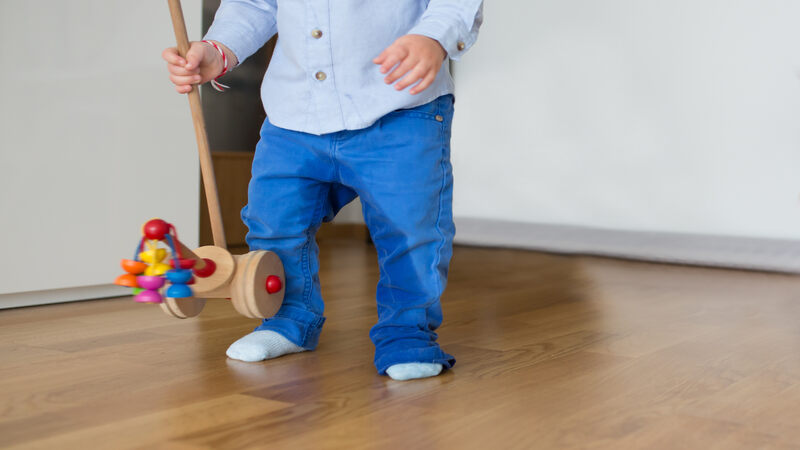
Truly, potty training is a challenging phase! It is smelly, it is awkward, but it is actually fun! The tiny ones just know nothing but to be happily doing whatever they want, anytime! This can include roaming around the house with a soiled diaper or without it!
Now, retaining soiled diapers is not only unhealthy but also uncomfortable for the toddler. In some cases, parents who started potty training before 18 months and after 32 months experience a potty training regression in their toddlers (1). So, toddlers can soil their diapers even after you potty train them. Don’t worry. Here are some tips for you to deal with the potty training setbacks in toddlers.
In This Article
Best Tips on Dealing With Potty Training Regression
Lots of factors can trigger a potty training regression in toddlers. If you feel your toddler is showing regression after successfully potty training then here are some tips for you:
1. Don’t Think it is Bad
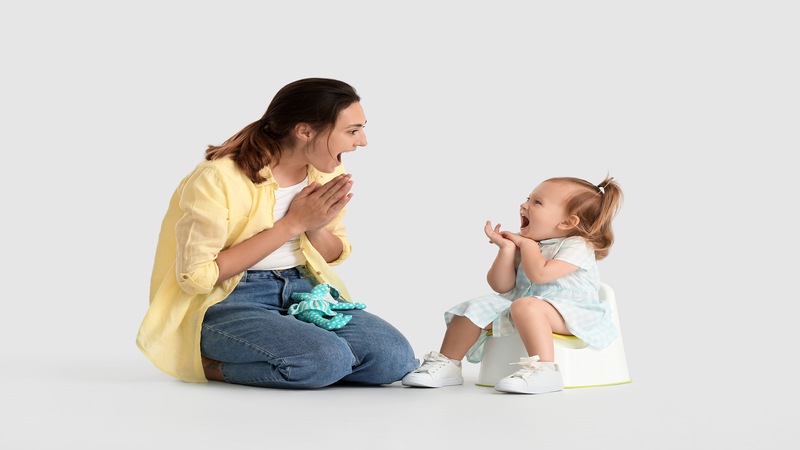
Always find the fun in such awkward situations. If you do not like the job called parenting, it will show! Your toddler will be more uncomfortable and reluctant to learn and feel more introverted if you are strict with them (2). That will actually increase the chances of soiling the pants. Instead of scolding your kid, treat it as a natural incident.
2. You Are Not Alone
The actual habit of sitting on the potty chair follows after helping the kid to adapt to bowel movement while sitting for 5 to 10 minutes (3). Understandably, it is totally a difficult thing for a toddler to adjust to potty training initially. So, there will be setbacks. Almost all children have a few of these setbacks before they learn to adapt to their instincts. Parents need to inspire them to be attentive to their instincts.
3. Let Them Play With The Potty Chair
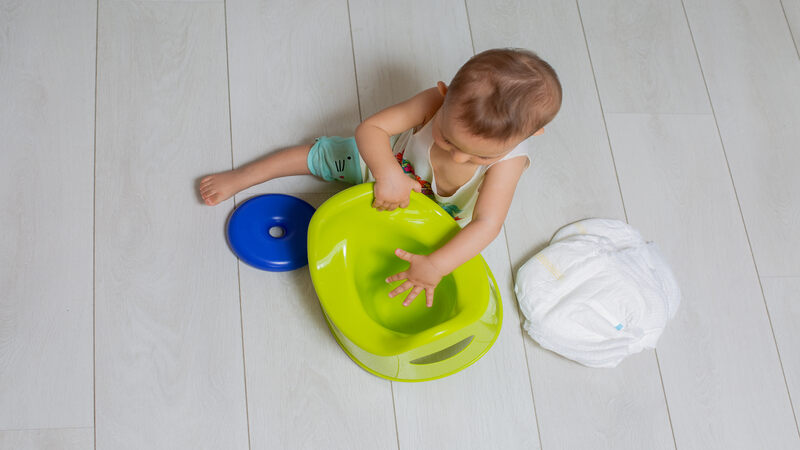
Maybe, you have not given your little one enough time to adjust! Maybe, the chair is uncomfortable or the kid just simply does not like the design or color of the chair somehow! Sometimes, the urine guards can feel uncomfortable. Allow the necessary time. Help your toddler understand the chair as a plaything. Help the tiny one acclimatize to the feeling of sitting bare-bottomed on the chair. Kids are moody. You need to understand their moods and adjust accordingly.
4. Use Potty Seats With Stairs While Potty Training in Adult Toilets
They are little! The adult toilets are big and risky for them! Always set up a special potty seat for toddlers on the adult toilet. Parents need to be sensitive to the rights and demands of their kids to ensure their holistic development (4). Take your time, be patient, and be attentive.
5. Sway Their Unnecessary Fear With Your Smile And Presence
Toddlers can be fearful of the gurgling sound of the toilet flush (5). You can dismiss this fear by saying it is a good thing and there is nothing at all to fear because momma is always there to protect.
6. Let go of The Diapers And Embrace Potty Training Pants
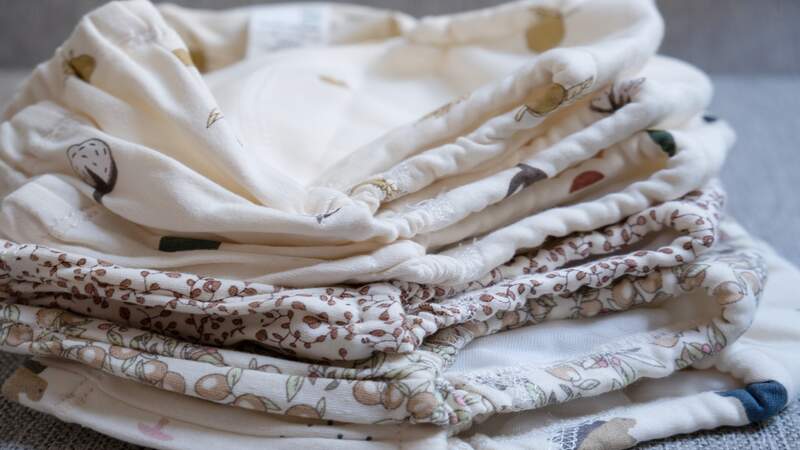
Well, potty training is not a straightforward mechanical process. Kids can take from a few weeks to 6 months to learn the need to go to the bathroom when they need to poo (6). That also requires a lot of training! You will need to gradually help the toddler to let go of the diapers. Special potty training pants can make it easy for you.
7. Influence Their Imagination
Toddlers totally live in their world of fantasies and imaginations. They love to think about what they see and add their own imagination to it (7). Sometimes their tendency of imagination can make them anxious (8). So, an uncomfortable potty training seat can actually appear in their imagination as a cave with no ending! Which can regress the process of potty training further. You can help your kid imagine the potty seat as the magical throne of a king or queen where one can sit to get rid of all the dirt in their stomach.
The Right Way of Teaching Hygiene
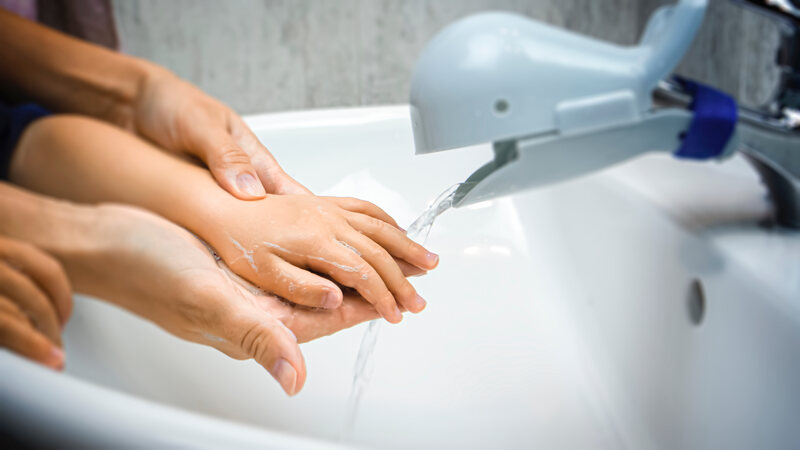
Toddlers can not understand complex topics of germs and hygiene! But they can learn by following and imitating you (9). So, tell the little thinker that you also wash your hands all the time after sitting on the chair. Do not neglect washing their hands after every session. The toddler will definitely pick up the habit soon.
Yes, it is undoubtedly stressful especially when you face a sudden setback after successfully completing potty training sessions with your toddler. But you must never think of potty training as a stressful task. Be patient and enjoy the happiness of helping your little one grow. Share the task with your partner and your kid will soon learn it.
FAQ’s
1. Why Does a Child Regress After Being Potty Trained?
A toddler can show regression after potty training due to various reasons. A change in their routine, fear of the toilet seat, and prolonged habit of the diaper are some of the reasons that can cause potty training regression.
2. How do You Fight Toilet Anxiety?
You can fight toilet anxiety in kids by simply making potty training more fun. You can use songs and books on potty training for help. Use potty seats for an easy and risk-free potty training session with your toddler.
References
- Kiddoo DA. Toilet training children: when to start and how to train. CMAJ. 2012 Mar 20;184(5):511-2. doi: 10.1503/cmaj.110830. Epub 2011 Aug 8. PMID: 21825046; PMCID: PMC3307553. – https://www.ncbi.nlm.nih.gov/pmc/articles/PMC3307553/
- Loginova SV, Slobodskaya HR. Interactions Between Child Personality and Parenting in Relation to Child Well-Being: Support for Diathesis-Stress and Differential Susceptibility Patterns. Front Psychol. 2021 Aug 3;12:558224. doi: 10.3389/fpsyg.2021.558224. PMID: 34413805; PMCID: PMC8369233. – https://www.ncbi.nlm.nih.gov/pmc/articles/PMC8369233/
- Allen P, Setya A, Lawrence VN. Pediatric Functional Constipation. [Updated 2024 Jan 11]. In: StatPearls [Internet]. Treasure Island (FL): StatPearls Publishing; 2024 Jan – https://www.ncbi.nlm.nih.gov/books/NBK537037/
- National Academies of Sciences, Engineering, and Medicine; Division of Behavioral and Social Sciences and Education; Board on Children, Youth, and Families; Committee on Supporting the Parents of Young Children; Breiner H, Ford M, Gadsden VL, editors. Parenting Matters: Supporting Parents of Children Ages 0-8. Washington (DC): National Academies Press (US); 2016 Nov 21. 2, Parenting Knowledge, Attitudes, and Practices. – https://www.ncbi.nlm.nih.gov/books/NBK402020/
- The impact of sensory issues on toilet training, Bladder & Bowel UK – https://www.bbuk.org.uk/wp-content/uploads/2022/09/The-impact-of-sensory-issues-on-toilet-training-paediatric-Bladder-Bowel-UK.pdf
- Toilet learning: Anticipatory guidance with a child-oriented approach. Paediatr Child Health. 2000 Sep;5(6):333-44. doi: 10.1093/pch/5.6.333. PMID: 20177551; PMCID: PMC2819951. – https://www.ncbi.nlm.nih.gov/pmc/articles/PMC2819951/
- Kushnir T. Imagination and social cognition in childhood. Wiley Interdiscip Rev Cogn Sci. 2022 Jul;13(4):e1603. doi: 10.1002/wcs.1603. Epub 2022 May 27. PMID: 35633075; PMCID: PMC9539687. – https://www.ncbi.nlm.nih.gov/pmc/articles/PMC9539687/
- Dr. Robin Alter, Skidmore College, Saratoga Springs, New York – http://www.docrobin.com/the-role-of-imagination-in-children-with-anxiety/
- Centers for Disease Control and Prevention – https://www.cdc.gov/clean-hands/prevention/index.html
